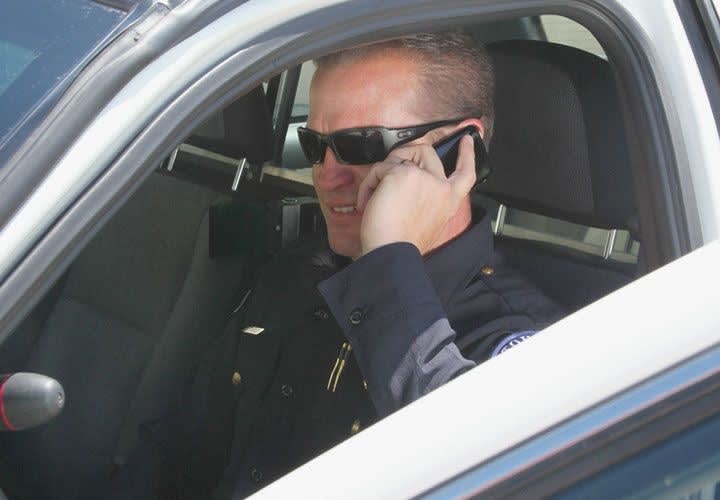Increasingly, law enforcement agencies issue electronic communication and information equipment to employees for their use in performing official duties. Access to and use and monitoring of the information stored or transmitted by means of such devices may be subject to a variety of employer policies, state and federal statutes, constitutional provisions, and case law.
Increasingly, law enforcement agencies issue electronic communication and information equipment to employees for their use in performing official duties. Such devices may include desktop or notebook computers, mobile digital terminals in police cars, iPads, cell phones, pagers, BlackBerrys, and other products that will come onto the market as the technology develops.
Access to and use and monitoring of the information stored or transmitted by means of such devices may be subject to a variety of employer policies, state and federal statutes, constitutional provisions, and case law.
Though courts have generally lagged far behind in the task of applying yesterday's rules to today's technological innovations, an opinion issued in 2010 by the U.S. Supreme Court (in a case considering a set of facts from nine years earlier) made a very limited attempt to give constitutional guidance. The issue presented was whether police managers violated a sergeant's Fourth Amendment privacy rights by auditing the sergeant's text messages sent during duty hours over a department-issued electronic paging device.
City Of Ontario V. Quon
Jeff Quon was a SWAT sergeant at the Ontario (Calif.) Police Department. In 2000, he signed a written statement acknowledging that he had read and understood the department's "Computer Usage, Internet and E-mail Policy." This policy specified that the City "reserves the right to monitor and log all network activity including e-mail and Internet use, without notice. Users should have no expectation of privacy or confidentiality when using these resources."
The next year, Quon was issued an alphanumeric pager capable of sending and receiving text messages. Although the computer policy did not specifically mention text messaging, managers notified employees that the policy would also apply to the new devices.
The department had estimated how many text characters officers were expected to use in a month on the job and had signed a service agreement with the provider based on that estimate. When it was later apparent that some officers were greatly exceeding their monthly allotments, management decided to conduct an audit to assess the need to revise the service contract, to eliminate the monthly task of collecting fees from officers for the excess usage and remitting to the provider.
In the course of this audit of on-duty texting, management discovered that Quon was using the pager for personal messaging during work hours. In one month, for example, Quon sent or received 456 messages while on duty, of which no more than 57 were considered to be work-related. On an average workday, he sent or received 28 messages, of which only three related to police business.
As a result of these findings, Quon was disciplined, apparently for unauthorized personal use of official equipment. He then sued the department, claiming a violation of his Fourth Amendment rights.
Although Quon and other plaintiffs questioned the propriety of the managers' reading of officers' messages, the jury found that the employer conducted the audit of Quon's texts for a legitimate, work-related purpose-namely, to evaluate the need for a new service agreement. The Fourth Amendment claim was therefore dismissed.
On appeal, the Ninth Circuit Court of Appeals reversed, ruling that Quon had a reasonable expectation of privacy in his on-duty text messages in spite of the computer policy, and that the employer's audit was an unreasonable invasion of that privacy right. The City appealed to the U.S. Supreme Court.[PAGEBREAK]
The Supreme Court, in a judgment concurred in by all nine justices, reversed the Ninth Circuit and held that assuming Quon had a reasonable expectation of privacy in his texts sent via an employer-furnished pager, management's limited audit of his on-duty texts for the purpose of evaluating the need for a new service agreement did not constitute a violation of the Fourth Amendment.
At the same time, the court cautioned that its decision would not necessarily cover all instances of access to electronic information.
Takeaway Value
Several important points can be derived from statements in the court's decision in City of Ontario v. Quon:
Public employers are bound by the Fourth Amendment. "The Fourth Amendment applies when the government acts in its capacity as an employer. Individuals do not lose their Fourth Amendment rights merely because they work for the government instead of a private employer."
Legitimate expectations of privacy may evolve with changing technology. "The Court must proceed with care when considering the whole concept of privacy expectations in communications made on electronic equipment owned by a government employer. Prudence counsels caution before the facts in the instant case are used to establish far-reaching premises that define the existence, and extent, of privacy expectations enjoyed by employees when using employer-provided communication devices. Rapid changes in the dynamics of communication and information transmission are evident not just in the technology itself but in what society accepts as proper behavior."
It is important for employers to have clear, comprehensive policies that put employees on notice of the conditions of use of department-issued equipment. "Employer policies concerning communications will of course shape the reasonable expectations of their employees, especially to the extent that such policies are clearly communicated."
Since police communications may become evidence in a criminal case, officers should realize the risk that their messages may have to be disclosed. "Even if he could assume some level of privacy would inhere in his messages, it would not have been reasonable for Quon to conclude that his messages were in all circumstances immune from scrutiny. As a law enforcement officer, he would or should have known that his actions were likely to come under legal scrutiny, and that this might entail an analysis of his on-the-job communications."
The ruling in Quon may not apply to all future scenarios of employer access to employee communications made over employer-issued devices. "A broad holding concerning employees' privacy expectations vis-à-vis employer-provided technological equipment might have implications for future cases that cannot be predicted."
The Supreme Court emphasized that it was not necessarily finding that Quon had a reasonable expectation of privacy in his texts over departmental pagers but was simply assuming that he did for the sake of argument, since the case could be resolved by finding any invasion of such an arguable expectation was reasonable under all of the circumstances.
Said the court, "Quon was told that his messages were subject to auditing. The search was permissible in its scope. The employer did not violate Quon's Fourth Amendment rights."
Prudent Precautions
Even though the Supreme Court declined to lay down any hard and fast rules that might give concrete guidance to both management and officers, two conclusions seem safe to draw.
Management: In consultation with civil legal advisers, managers should promulgate written policies covering the conditions of employees' use of all issued equipment, including communications devices, that clearly spell out permissible and impermissible uses and the fact (as applicable) that employee use is subject to monitoring, auditing, and discipline for unauthorized use.
Employees: Officers and others who are assigned communications devices by their employer should be sure they understand and abide by applicable policies regarding personal use and management oversight.
Both managers and employees should consult local legal advisers for additional considerations. (Connecticut and Delaware, for example, statutorily prohibit unannounced monitoring.)
Devallis Rutledge is a former police officer and veteran prosecutor who currently serves as Special Counsel to the Los Angeles County District Attorney. He is the author of 12 books, including "Investigative Constitutional Law."













